Back in February (the 9th to be exact) I sat down with Dead Prez at The Jazz Café in what proved to be a steep learning curve for me in human interaction (basically a right angle in fact), and what was for them, I’m sure, a harrowing test of patience and endurance, as I rambled, stuttered, and mumbled my way through an altogether awkward but revealing twenty minutes. Luckily I had Kiera the photographer to ask a couple of all-important questions that I failed to “action” due to my skittish disposition. In my defence, I am a huge fan of Dead Prez and this is my first ever interview. So there’s that.
Dead Prez are a hip-hop duo out of NYC formed in the mid-nineties. Their first LP Let’s Get Free, released back in 2000, was an hour long, switched on, militantly aware testament to their leftist/socialist political beliefs, along with their life experiences and issues encountered growing up in the USA as black African-Americans. Tracks like ‘They Schools’, for example, explains the unenthusiastic and ineffectual education system for black citizens at the time – they had to self-educate as a result of the severe lack of black history taught in the schools they attended, where what was taught was minimal and more often then not degrading.
Their latest LP, Information Age (2013), is equally as enlightening, though far more futuristic and crisp sounding, production-wise. But it still has the incisive and brutally honest lyrical content from the collective consciousness of Stic.man and M1. So go listen to it now.
So how are you finding the weather?
M-1: It’s cool, we’ve been out here in Europe and moving around so I’m acclimatised. We knew we came to the cold…
Have you got your thermals on? Your long-johns?
M-1: Yeah, a couple of pairs of pants on [laughs]
I’ve been a fan of yours for a long time. Was it 2000 when Let’s Get Free came out?
M-1: Yep, March 14th, the year 2000, was when it was released into the public.
It’s still in the setlist of all the DJs round here…
M-1: [Makes whipcrack noise]
Every time I go to a hip-hop night you always hear ‘Hip Hop’ dropped, it’s stood the test of time…
M-1: I’m glad to hear that testimony!
Is it the same in the States?
M-1: Well I don’t go to the clubs a lot so I can’t really hear what they drop, but I do know that’s what they say! I’ve heard that, yeah.
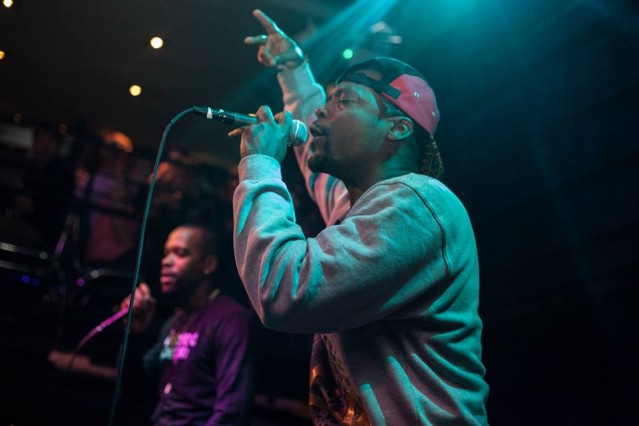
Your last album, ‘The Information Age’ was out at the beginning of 2013. Why the tour now, have you got some new material coming out?
Stic.man: Yeah. I mean, we doing it because, you know, the market is here for us and we wanna come touch the people. Like you said, our sentiment is timeless. It’s not about a hot new dance single, it’s about life experience.
Of course, you’re a politically active act. Would you say you have socialist roots?
M-1: One of the hugely influential organisations in my life, politically, while we’ve been around each other, has been the African People’s Socialist Party. But even before we get into that I just want to say this too about the music: a lot of what we’re doing is not just album driven. We do put out albums, but the idea of Dead Prez means a lot for the ideas we produce. So touring as Dead Prez presents those opportunities – it’s not just a rigid sense of how artists tour for promotional purposes, but definitely like, you know, the books, the merchandise, the songs, who we are and what we represent in our way. And also, although you might not have seen a Dead Prez album project, there’s not only the remixes of ‘Time Travel’ that came out after The Information Age was out, which is part of that album, but then you got Stic’s Fit Club, and if you look at Dead Prez all of that is gonna be there as well.
A lot has happened politically since you started the Dead Prez project. What’s your view on the current Obama administration?
Stic.man: Well, I’ve got a lot more on my mind than the Government, a lot more on my mind than Obama. And I’m saying that deliberately because sometimes you can get pigeonholed in your focus, when there’s a whole lot more going on in life and a lot other ways how one can be empowered. So those are things I try to add onto the conversation. Because the government ain’t changed since Let’s Get Free, so nothing has changed about how we feel about that!
How do you function with a government like that though? As someone with firm beliefs, you must be disappointed on some level?
Stic.man: I get what you’re saying, totally, your question is legitimate. The way you deal is you have to find ways to be empowered. Some of those ways we’ve talked about a lot in our early work: being involved in organisations, taking up causes that you feel like you can make local impacts in. Some of those causes for me have been health and fitness, doing a lot of work in terms of my own development, certain commitments I’ve made to not drink or smoke. I started the RBG fit club: we promote running, meditation, yoga, weight-lifting, vegetarianism. We also work with people who are doing local gardening and being sustainable off the land, things of that nature. What they call Urban Farming in the States, so hood farms, right? These are ways to, as you say, deal and cope in the moments of the days. The big picture is: let’s get freedom. The pieces of the picture, you know what I mean? What is that? What does it look like? And what are the ways we can start thinking and living that are empowering, that give us value to challenge the status quo? Something to fight for.
Funnily enough, as of about three days ago now, I’ve decided to go vegetarian and stop drinking…
Stic.man: Salut! Mazel tov!
I thought I’d cut meat out completely. Because you could eat what they call ‘happy meat’, free-range, but I thought if I cut it out completely I wouldn’t eat any of the junk either, ‘cos I’m a bit of a junk fiend…
Stic.man: You’re on the right page. But for me, the same way, I’m not fanatic about socialism. I feel that socialism in principle, in theory, has some strong community values, right? But I also live in capitalism, right? When I was younger I had all of these certain ideas and yada yada, but I’ve come to see that the function of what you’re living in, you have to understand. Like, OK, what is this? The same reason why we sell our CDs, the same reason why we have to learn how to make money and market things and yada yada yada. I’m not a fanatic, I’m not going to say capitalism is good for the world, I’m NEVER gonna say that, but I’m not a fanatic on none of that shit, and I’m not a vegetarian fanatic. I think that some people eat meat and it effects them differently than it does others. So my view is more like Jeet Kun Do, if you’re familiar with Bruce Lee. He created an art called Jeet Kun Do, a philosophy and a martial art. The main tenet was, like hip-hop, you sample from different things and you make it your own. Jeet Kun Do. So he did that with boxing and all this different grappling, hip-hoppers do it with, sample this beat and this riff, right? And ideologically, that’s how I approach. You take what works for you and see if that works in the world.
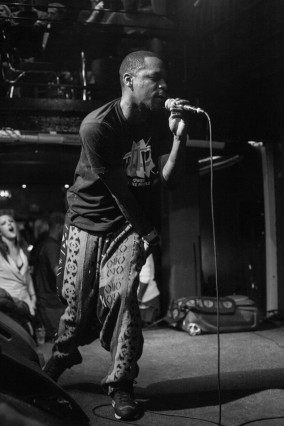
Did you choose music as a platform, or did you just fall into it?
M-1: I say this all the time: I didn’t so much choose music, you know, music was part of the culture that I live in, and a heavy part of it. And I guess it probably is a part of every culture, obviously. But I just remember growing up like, you know, being who I am, walking hip-hop, talking the language, learning a new code of ethics that was emitted totally through my cultural reflection. I do know there was at one time a point where I felt the responsibility to make a move that would effect my life bigger than my life, you know? I saw, OK, you can kind of hustle or you can, you know… And so that’s kind of like where that perspective or understanding of the movement of people towards liberation happened, you know what I’m saying?
I wouldn’t call it so much of a platform but it’s definitely when I knew, like, we in this together, as people, and the only way we’re gonna get out of it is to get together and angle our ideas and get some power amongst ourselves to do whatever it is – whether it be have a building, or grow, or teach our children. Then I was trying to spread that idea. I learned the classic tools of propaganda from organising. And so these tools, everything from making a leaflet to getting on television, make a commercial, do a poster, you know, everything, everything. Engage the people. Classic marketing techniques, you know what I’m saying, that are used pretty much by everyone. Music, when that happened, there was a magic moment. ‘Cos music was magic already, but as a point where those two came together, it was magic for me. And I understood akin to people who had used music in that way before…
Because you’ve played Jazz Cafe before with Brian Jackson, right?
M-1: I played here with Brian Jackson before. We’ve played here as Dead Prez before.
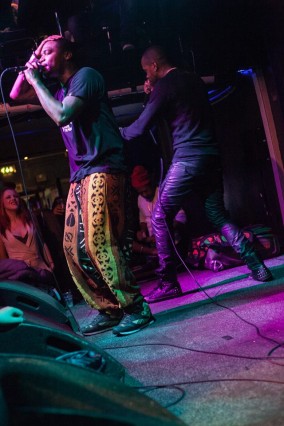
How many times have you been around the block in the UK?
M-1: I can tell you that the day before our album dropped, March 13th, we came here to London. And we did a show for the release of our album, Let’s Get Free; the first time we ever came, I believe. I might be wrong, but I think that’s the first time we ever came. That was at this little underground spot in West London called Subterrania…
Stic.man: Mmmmmmm!
M-1: …and we did this thing and it was, phew, it was just mashed. It was a great reception for Dead Prez. I was surprised by it, I was totally blown away…
Stic.man: It was crazy…
M-1: It was off the wall! And since then it’s been a hell of a ride in London, and it’s been cool. We’ve connected with a lot of community organisations, we’ve connected with a lot of people, and I feel great about coming here all the time. And I look forward to tonight, too!
Keira: In terms of getting the message out there, is there anyone that you saw perhaps doing it through music, or another way, that you thought, “wow, that is inspirational”?
Stic.man: Definitely. Bob Marley. Bob Marley, Bob Marley, Bob Marley. Curtis Mayfield. Lauryn Hill. Nas. But I would say, as far as message music, Bob Marley and Tupac, they were big influences. Mobb Deep was a big influence on our sound. And also, for me coming into my voice as a writer, Prodigy, the way he could articulate street shit articulately. As I was developing my craft I would listen to him a lot. For me, I wanted to articulate the power politics the same way, so he’s a big influence.
M-1: For me, I would say Fela Kuti at this moment, as far as what it meant to take it to that level. Unfortunately Bob was cut short in his journey. And so was Fela, but not so much in the volume of his work. And what he was able to do, you know, his Mother was involved directly in the politics of West Africa, who brought Kwame Nkrumah II to Nigeria, and you can tell the influence on that, and what he has created today, and what still exists in the Kalakuta Republic and the rest of it with him. I am a fan obviously of Bob, you know, as Stic stated, but what is fantastic about being able to meld the music into how you culturally stand is you’re able to challenge the standpoint of the government. Recently I did a song with Seun Kuti, who was Fela’s youngest son. It’s called ‘IMF’ or ‘International MotherFucker’, and it was released on the date of the US intervention into Nigeria’s government politics. I’m proud that the legacy of Fela, as well as Bob, can be people who create youth movements that still are bastions of hope, and oasis’ of places for that to be. So right now I’ve been studying Africa, African music, and essentially how to use it the way that Fela did.
And so the story ends there, kids, as does my conversation with Dead Prez.
If you wanted to see them live you’re bang out of luck as unfortunately they’ve cancelled their upcoming gig, again at The Jazz Café. If, however, you’re a die-hard fan and have some holiday pay to burn then you can catch them across the channel at La Storm Le Grand Mix, Tourcoing, France on the 20th of May, 2014.
Adieu!
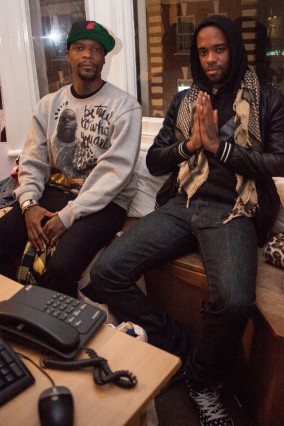
Words: Rory O’Brien
Photos: Keira Cullinane
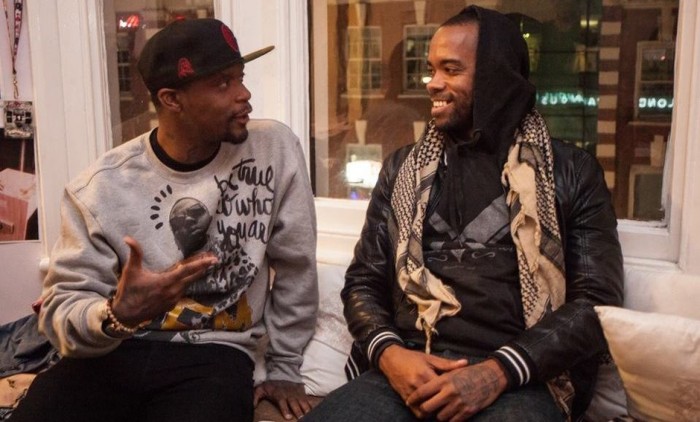


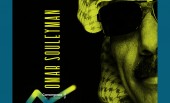


Follow us
Follow us on Facebook Follow us on Twitter Follow us on Google+ Subscribe our newsletter Add us to your feeds